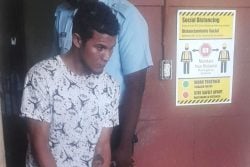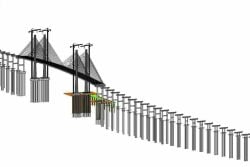Former prime minister Patrick Manning stated yesterday that he was “not aware at all” that President George Maxwell Richards’ phone was being monitored by the Strategic Intelligence Agency (SIA).
“What phones might have been monitored by the SIA was not known to me,” he said at a news conference after the Prime Minister’s statement.
Manning said he never authorised “any agency to look into the private affairs of citizens” who had not come to its attention as a result of illegal activities.
“But the (security) agencies have every responsibility to … protect the security of the state,” he stressed.
Manning admitted that he knew wiretapping was taking place. However, he said he never knew whose phones were being bugged and had never requested any state agencies to wire-tap the phone of anyone. Asked whether he knew wiretapping was illegal, he said: “The way the PNM has operated in government, is that we start a programme and if the programme works well, you give it a legislative complexion.”
He said the same applied to the PNM government’s social sector and cited CEPEP as an example. He added that the National Security Council, of which he was chairman, just before “I left office … in March or April” had taken a decision to introduce wire-tapping legislation.
Manning said the SIA was “designed” under the PNM government (1991-1995), but was set up under the supervision of Basdeo Panday as head of the UNC government of (1995-2000).
“They controlled the agency in its formative years and however the agency emerged it was largely the result of actions of the UNC when they were in government … and when Mrs Bissessar-Persad was an attorney general,” he said.
Manning said the agency “had to have been wire-tapping under the UNC”. Did he ask this when he assumed office?
“I didn’t have to ask. They were clearly doing it,” he replied.
Manning said he was taking careful notice of the action of the Government, which has been “systematically dismantling the institutions of the State that are involved in the anti-drug effort and removing from office key people in the anti-drug effort.
“At first I wondered if it was coincidental but it is becoming clearer and clearer to me. It makes sense when you take into account the amount of money that the UNC-led coalition was able to expend in the election campaign. From what sources did this money come? And if … and I am going to make the case in Parliament, much of it came from drug sources, then what you are seeing now is the ‘payback’ by the Government. The Government is taking this country down a road where the nacro-dealers will have a major hand in the conduct of state business,” he said.
He spoke about the OPVs in this regard.
Manning also claimed the reason for the raid on the SIA was for Government to find out what information the agency had on the drug dealers. He further claimed that Government had been attempting to prevent him from speaking on crime matters in the Parliament. He said he had been seeking to speak in Parliament for at least one month. He first signified his intention with the anti-gang legislation and then it was put on a lower priority on the Order Paper, he said. The same thing happened when he indicated that he wanted to speak on the Bail Bill, he said. He also alleged that the Speaker yesterday took action to prevent him from speaking.
Recalling that as prime minister he had been called by special branch in the past and cautioned against visiting a person who was the subject of attention of the branch, Manning said: “If in the course of the work of intelligence agencies they come up on the associations of individuals who are outstanding citizens, associations that are of concern to them, they have a responsibility to investigate it. It becomes then not a matter of who you are, but a matter of national security.
“And in those circumstances nobody is above the scrutiny of the State when it comes to national security matters, whether you be prime minister, minister, judge, journalist or anybody else,” he said, adding that no law-abiding citizen had anything to fear from intelligence agencies.
“What worries me is when the Prime Minister comes to Parliament and makes a statement of that nature and then takes action to curtail the activities of the security agencies, looking at one side of the story, completely ignoring the fact that the major issue facing Trinidad and Tobago is the drug trade,” Manning said.
Earlier, the Parliament witnessed the unpleasant sight of Manning, who is the longest serving MP, asking to have the Standing Orders waived so he could respond to Persad-Bissessar.
“There is no procedure (for you) to make a statement,” House Speaker Wade Mark explained.
“Please, please,” Manning beseeched, rising to his feet.
“Could you take you seat, honourable Member for San Fernando East,” Mark said.
But Manning continued to plead, ignoring the rule that once the Speaker is on his feet no member should stand or speak.
“You cannot be on your feet when I am on my feet,” Mark said, repeating his statement that there was no procedure for Manning to make a statement in response to the PM, who had spoken under the item “Statements by Ministers” on the Order Paper.
Manning rose again.
“What are you standing up for?” Mark asked, sounding slightly exasperated by this time.
“To make a request,” Manning replied meekly.
“Request for what?” Mark asked.
“Can I have your leave to make a request?” Manning pleaded.
“No, no. Listen if you continue to stand on your feet while I am on my feet, I would ask you to leave the chamber,” Mark said sternly, provoking a round of “oooooooww” from the Government bench.
“You take your seat, okay!” Mark said.
Manning persisted: “Mr Speaker can I have your leave to make a request.”
Mark ignored him and the Procedural clerk began to read the items on the Order Paper and the House went on with its business.




